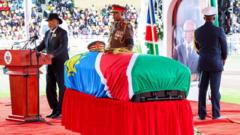**In a momentous decision, Namibia has declared its first national day of remembrance for the genocide perpetrated by German colonizers, marking a significant step in acknowledging historical injustices.**
**Namibia Commemorates Colonial Genocide with First National Memorial Day**

**Namibia Commemorates Colonial Genocide with First National Memorial Day**
**Historic observance highlights the enduring impact of the genocide committed from 1904 to 1908.**
Namibia has officially instituted a national commemoration day to honor the victims of the colonial genocide that occurred between 1904 and 1908, marking a historic milestone for the nation. Commonly referred to as "Germany's forgotten genocide," the systematic extermination resulted in the deaths of over 70,000 Africans, predominantly from the Ovaherero and Nama communities, who resisted colonization efforts.
The newly established Genocide Remembrance Day will take place on May 28 each year. This date was intentionally chosen to coincide with the announcement in 1907 when German officials declared the closure of concentration camps following widespread international condemnation. The observance aims to facilitate a "journey of healing" for Namibians and will feature a minute of silence and candlelight vigils, notably outside the parliament in the capital, Windhoek.
Historically, the genocide involved brutal practices laid out by German officials, including the implementation of concentration camps and experimental procedures that bore resemblance to methods used in the Holocaust. However, acknowledgment from Germany has come slowly; it was only in recent years that the German government formally recognized the atrocities committed, proposing €1.1 billion in developmental aid to Namibia.
The offer, however, has received backlash as it lacked legal language addressing "reparations" and "compensation." Many Namibians viewed it as inadequate, calling for a genuine apology and restitution for lost lands. Activists argue that the proposed aid is insufficient compared to their ancestral claims and the wrongs inflicted upon their communities.
In response to criticisms surrounding past colonial practices, a draft agreement facilitating an official apology from Germany and additional financial assistance has been discussed, yet many local advocates remain skeptical about the authenticity of these efforts. They assert that true reparations should include the restitution of ancestral lands now under the ownership of German-speaking residents.
Research reveals the ironic history surrounding the reparations issue, highlighting that prior to the genocide, it was the Ovaherero and Nama who had to pay for their resistance during colonial conflicts. Estimates suggest these costs in livestock resulted in values comparable to contemporary financial figures.
As Namibia moves forward with its national observance, the historical context and ongoing calls for justice reveal a complex and often painful legacy that continues to shape relations between Namibia and Germany. The commemoration not only serves to remember the victims but also highlights the necessity for continued dialogue and restorative justice. The observance is a critical step in confronting a painful past, but for many in Namibia, the journey towards true healing remains incomplete.






















